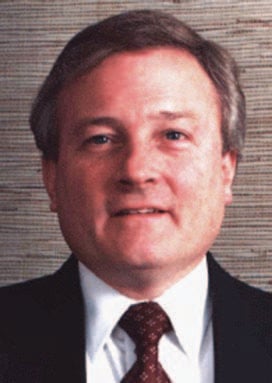
When Joe Reynolds ’69 launched his first company, FTI Consulting, in 1982, he built it on the academic model he learned as a student and research assistant at Johns Hopkins. “The relationship between faculty and students mirrors the structure of business,” he says. “The concept of multidisciplinary teams is the only way in today’s world to solve problems. No single investigator can solve all the problems.”
At Hopkins, Reynolds earned a degree in electrical engineering and began working in the Physics Department as a research assistant. “My experience at Hopkins molded me in many ways,” he says. “I learned how to solve problems. I learned the value of collaboration.”
When Reynolds left Hopkins, he joined Trident Engineering, based in Annapolis, Maryland. He began working in instrumentation, developing an expendable device to measure the height of waves and seascapes. He also worked on a team that built instruments to detect light and color variations on the moon in order to determine if the moon had any volcanic activity. “At that time, we hadn’t been there yet,” he says with a chuckle.
From Trident, Reynolds went on to join the ranks of a company called Computer Aided Design Company, or Cadcom for short. He designed solutions to prevent power plant failures and aircraft accidents. There, he also met Dan Lusac, a former Naval Academy professor, and his future business partner. Together, they launched FTI Consulting. Based in Annapolis, the company’s focus was the investigation of aviation and utilities accidents and failures to determine the causes and how they could be prevented in the future.
“Eventually we developed the phrase, ‘Forensic Engineering,’” he says. “We practiced engineering in a mirror because we looked backward to determine what happened, reported on it, and testified in court. Sometimes we effected the changes the government might make in terms of public policy. The most rewarding part was improving people’s lives by promoting better safety measures.”
FTI went public in 1996 and changed its focus to economics and accounting consulting. Reynolds left the company and, in 2003, launched a new company with many of the original FTI staff. Like his former company, Reynolds Technological Inquiries Limited (RTI) is based in Annapolis and, with a staff of about 130 people, investigates aviation accidents and failures, serving as international consultants of experienced expert witnesses. Reynolds is also the founder and president of Anamet Inc., a similar company composed of 50 individuals and located in San Francisco, as well as RTI London, which employs 50 people and has established the company’s presence in Europe and the UK.
Today Reynolds is recognized internationally as a forensic engineer and an authority on the investigation and analysis of large-loss accidents and failures. He has served as the team leader and technical director, as well as principal testifier, in many complex investigations around the world. He is an active member of the Institute of Electrical and Electronics Engineers (IEEE), the International Society of Air Safety Investigators (ISASI), the Expert Witness Institute (EWI), the Academy of Experts (AE), and the Royal Aeronautical Society of London.
And somehow, with three companies and more than 200 individuals under his care, Reynolds finds time to actively support Johns Hopkins University and the Whiting School. Initially, more years ago than he can pinpoint, he returned to Hopkins to lecture to undergraduate engineering students. “I was asked to come talk about what really happens in the business world. I talked about the importance of having a code of standards at work and in engineering. I gave them a different slant on the practice of engineering that maybe the students hadn’t thought of before,” he recalls.
Since then, he has become increasingly involved with the school. Along with his wife, Lynn, he funded a gift to support the Maryland/Krieger halls renovation, endowed an intersession course in the W.P. Carey Entrepreneurship and Management program,
“I saw the value of working together for a common goal and saw how effective it is to do so. I carried those lessons forward when I built my company. These are things I learned here, at Hopkins. And they’ve never failed me.” Joe Reynolds
and—most recently—endowed a professorship for the Whiting School. He is also currently a member of the university’s Board of Trustees and is the past president of the Johns Hopkins University Alumni Association, the founding chair of the Society of Engineering Alumni, and a member of the Applied Mathematics and Statistics Department Advisory Network.
This past fall, he was named the new chair of the Whiting School of Engineering’s National Advisory Council. In all of these efforts, Reynolds says it’s his way of giving back to an institution that has provided him with so much.
“As you begin to reflect on life, you think about what’s made a difference in your life,” he says, settling back into his chair. “One thing that has become clear to me is that Johns Hopkins made a big difference in my life and was a big factor in my success. I learned how to problem solve. I learned how to work as a team member as a student and research assistant. I saw the value of working together for a common goal and saw how effective it is to do so. I carried those lessons forward when I built my first company. These are things I learned here, at Hopkins. And they’ve never failed me.”




